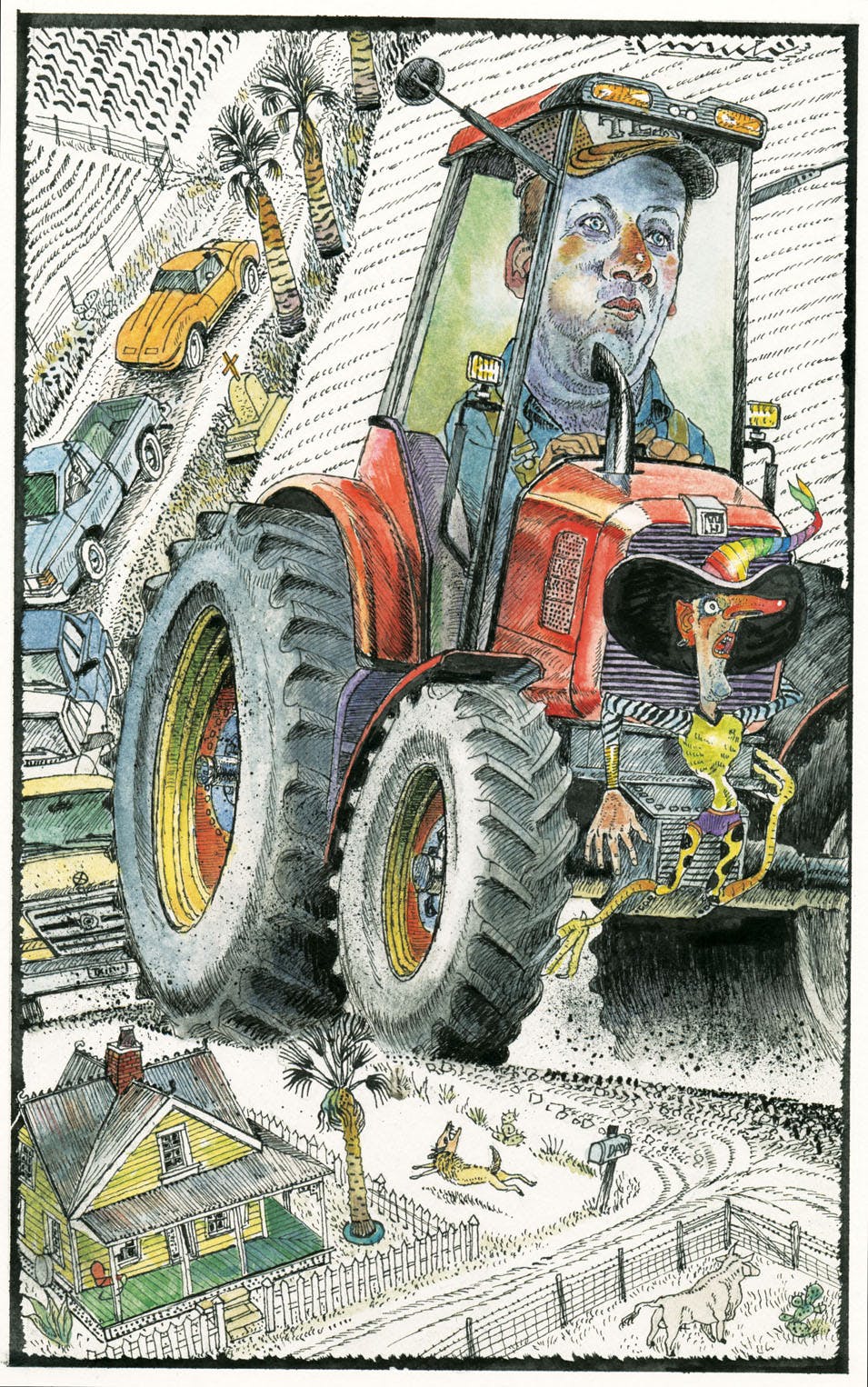
Q: While traveling in the Valley recently, I found my trip hampered not once but twice by slow-moving tractors in the roadway. After both encounters ended in horn blasts and a few choice words, I began to wonder, Just exactly how long is long enough to wait behind this sort of slow-moving rural roadblock before a person is allowed to react in the manner in which I did?
Name Withheld
A: The Rio Grande Valley, with its rich, loamy soils and subtropical climate, is the fruit basket of the state. And the vegetable basket, the cotton basket, the sorghum basket, and the sugarcane basket. And anytime you drive through a basket, you’re bound to have some trouble. You see, even though some of the basket’s produce does grow on actual trees, none of it grows on metaphorical ones. These crops are carefully cultivated by farmers who work sunup to sundown so that you will have food to, as President Bush once said, put on your family. And farmers don’t go places in a hurry. In fact, the way the Texanist sees it, the farmer’s role in society is not only to grow our foods and fibers but also to maintain our connection to the slow pace of nature. It is not unusual to experience a miles-long, teeth-grinding, fist-shaking tantrum when stuck behind one of these salts of the earth, perched up on his tractor like a pasha on an elephant, but it is not an admirable response. Next time you get caught tailing a tractor that’s chugging along a good forty or fifty miles per hour below the posted speed limit, try to enjoy the bucolic fields and orchards. And give a wave of thanks to those who work them. You wouldn’t bite the hand that feeds, so why should you bark obscenities at it? Not only do farmers provide the food that ends up on your table (or family), but they can also give you a much-needed excuse to slow down.
Q: I am moving back to Houston after a four-year stint in Dallas. When I lived in Houston previously, I built a huge BBQ pit out of brick, similar to those found in Lockhart at Kreuz and Black’s. Her name was Smokahontas, and she was the envy of my neighbors. When I moved, I went out and bought the same pit that everyone else has. Sure, it cooks a brisket, but nothing has ever compared to the succulent morsels that came off the brick pit. Now that I’m moving back to Houston and intend to stay put for a while, do I take the time to build another brick pit, or do I run out and get a steel trap like everyone else?
David Hudson, Houston
A: Sometimes at closing time, when the bartender has slipped into the back for a mop and the long, dark room, reeking of desperation and well liquor, stands empty but for a haggard old rodeo queen snoring irregularly into her sleeve, the Texanist will ask nobody in particular whether he should “have another.” Thankfully, no objection is ever raised. And though your situation is very different, the Texanist gathers that your conclusion is just as foregone. Still, there are a few things to say about this. A barbecue pit is more than just an implement through which meat is passed to make it smoky and delicious. For backyard pitmasters such as yourself, the smoker is an extension of personal identity, saying as much about you as do your drinking habits, style of dress, or grooming. The Texanist, for instance, prefers Scotch whisky, does not wear loafers, and has a humorously large but very unpretentious pit that says “The Texanist means business.” Whatever you do, you don’t want to be one of those people who gas their meat. Have you ever been to a gathering at the home of a friend of a friend, some puffed-up culinary whiz, where the meat comes out of one of those stainless steel auto-smokers? Those abominations probably cost more than the Texanist’s annual salary! [Editors’ note: Confirmed.] The brisket’s free-range and the pickles are made with heirloom vinegar and the coleslaw has hand-washed poppy seeds in it. The Texanist is too polite to decline, but that sort of froufrou feast leaves a terrible taste in his mouth, a taste that can be washed out only with a long night on the bar stool, which usually ends, as he has explained, and as your quandary does too, with a question for which the answer is indubitably “Yes.”
Q: When I decided to move to Texas from Ohio two years ago, I thought I would fit right in with my full-size, American-made pickup. Now that I’m here, I recognize a possible problem with my truck. It is not a Lone Star Edition, King Ranch Edition, or Texas Edition. I’ve driven trucks in Ohio my whole life, and I’m certain I never saw one of those up there. Should I trade in my regular truck for the appropriate Texas-branded truck, or can I get by with just adding some Texas detailing to it?
D. J. Reez, Laredo
A: As you have probably noticed, there are two things that Texas is chock-full of: pickup trucks and pride. Savvy truck marketers have seized on this fact, and it’s gotten a little out of control. The Texanist was taught not to wear his pride on his sleeve or on his truck’s quarter panel. Your feelings of inferiority are unfounded, as there is no shame in driving a plain, unbranded truck. Besides, all you have to do to make your current truck a real “Texas” truck is to haul yourself down to your local tax office, register your vehicle, and trade in those Ohio “Birthplace of Aviation” plates for ones that say “Texas Truck,” which should be branding enough for even the proudest truck driver out there.
Q: I am originally Canadian, but my family and I moved to Texas in 2003 and fell in love with the place. Now, because of work, we’ve moved far away from what we’d considered our home away from home. How can we keep our love of Texas alive?
Joseph Haun, Melbourne, Australia
A: The Texanist, when sabbaticaled in foreign climes (such as California), has often felt the need to stoke his home fires. On such occasions, he has sought comfort in the saying “You can take the boy out of Texas, but you can’t take the Texas out of the boy.” For you, the Texanist has made a slight adjustment. Each day, repeat this affirmation three times: “You can take the Hauns out of Canada and move them to Texas, where the Canada in the Hauns will be replaced by Texas, and then you can take the Hauns out of Texas and relocate them to Australia, but you just can’t take the Texas that replaced the Canada while the Hauns were living in Texas out of the Hauns.” It’s a mouthful, but it’s a lot better than walking around saying, “G’day, y’all!”








